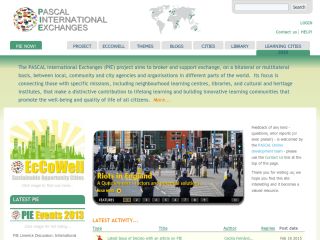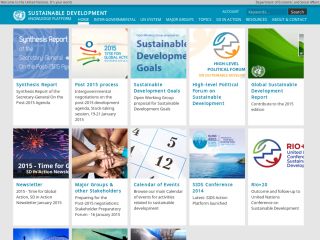Lifelong Learning and active civil society participation in achieving the new UN Sustainable Development Goals from 2015
Bruce Wilson highlights the importance of education and life-long/life-wide learning in the issue of sustainability. He asks where should we start? Those who go on in OTB to read the material in the Development: Where from, where to? forum will understand that my response would be to involve a network like ‘Peoples Voice Media (PVM)’ to get a ‘real ‘ discussion going on how communities and citizens can better understand what they can do and how engaged PASCAL professionals help them do it for themselves.
For far too long citizens and communities have been left out of the discussion. As a result they often see sustainability as a remote and somewhat intellectual entity.
So what I would like to see is for those following up Bruce’s good introduction on sustainability to form a series of questions to pose to real citizens and communities – those people operating at the local level - and also to pose short sharp notes on what engaged PASCAL professionals think are important topics to for them to understand to make constructive change.
We might also work with the Community Reporters in PVM to write up key stories off successful engagements in sustainability or how citizens/communities have overcome barriers to successful implementation of resilient processes. Let’s think about how OTB and PASCAL might facilitate this? For instance we might encourage a social network within PVM to get into a dialogue with PASCAL and work with us to develop sensible and sensitive guidance for improvement change for other groups.
I have also been interested in how the process of ‘Nudging’ could be adapted to promote citizen/community learning in a different way. Cass Sunstein – a Law Professor at Harvard – recently gave a most interesting video production on ‘Nudging and its Impact’ which is the subject of my discussion topic Enter Behaviour Change and may further stimulate thoughts in PASCAL readers of OTB. Nudging is a different form of learning which can be extremely valuable for those who are unconventional learners or who havefound it difficult to learn about new processes and ways in the past. I'd like to hear from others who have found alternatives to conventional learning in case we can improve how we can support citizens and communities who wish to flourish under their own efforts.
James
James's comment about involving the people and communities is central to sustainability education. Without involvement there is no commitment and the more active it is the more committed it becomes.
Some 20+ years ago at the IFIP Conference in Darling Harbour, Sydney, a satellite link was opened between students at Paramatta High Schools and a school in Espoo Finland to discuss their findings in a project on pollution in local rivers. They had both used simple pollution measuring instruments to obtain data which they shared with the delegates at the conference and between themselves. It was a huge success. Such interactions are unfortunately rare but they lead to a number of possibilities for citizen involvement in 'watch' programmes for continuous monitoring of local environments. Waterwatch, treewatch, riverwatch, airwatch, energywatch, etc come to mind and there will be many more, possibly led by children and mobilising whole families. All that would be needed would be the development of inexpensive measuring instruments, some education and leadership by local authorities and a means of publicising the results to everyone. That may eventually become an essential part of the school curriculum. It is probable that there are already some shining examples out there somewhere.
Norman
Margaret Sutherland has posted an item on MOOC developments at Glasgow in the context of the current Big Tent Communique discussion on the OTB site, to which I have responded.
Given its relevance to this discussion I am adding a note to foster a dialogue here, especially about the SDGs as they apply to the advanced economies (but not so advanced societies?) where poverty, social exclusion and the gulf between haves and have-nots continues to widen. We should stop thinking that Education for All (EfA), the MDGs, SDGs and other development efforts were and are just for 'underdeveloped’ people in the ‘global South’. They apply universally. I hope the MOOC that Margaret refers to will reach and engage people in ‘the South’, but let us also put the northern houses into better order.
Things have moved on since the ambitious SDGs were draft and negotiated over earlier, throughout this year and before that, as the piece below coming from the work of ASPBAE in the Asia-Pacific region reveals. Lifelong learning advocates feel reasonably pleased with its visibility compared with the marginalisation that occurred in the previous Millennial Development Goals (MDGs) and Unesco’s Education for All (EfA).
The question now is how we ensure that the SDGs remain high on political agendas, and that the lifelong learning of adults as well as the young, of communities and localities as well as of individuals, is not again lost from sight.
Humanitarian, economic, ecological and other global geo-political crises not only take attention away from longer term sustainable development: many exacerbate precisely the problems that the SDGs seek to resolved. Rather than improve our success of reaching UN-agreed targets we confront the opposite possibility: the targets will recede as the numbers of the abused, displaced, starving and terrified explode. More than ever local communities need to act out the best in human nature that is lost to realpolitik and work locally in the expressed spirit of two very different leaders: Pope Francis and Malala Yousafzai.
Can Pascal and its Friends, PIMA, rise to the challenge as ASPBAE so clearly does?
UN adopts 2030 agenda for sustainable development
Transforming Our World for People and Planet 25-27 September 2015, New York. U.S.A.
The UN General Assembly, attended by over 150 world leaders, formally adopted the new sustainable development agenda at the opening session of the Sustainable Development Summit held at UN Headquarters in New York.
Addressing the Opening Session of the UN Summit, Pope Francis made a passionate call to the General Assembly to choose peace and environmental justice over a “boundless thirst for power and material prosperity”. For her part, Malala Yousafzai, joined by youth from all 193 Member States during the opening session, made a powerful address to the General Assembly to “be united in the goal of education and peace”, stressing that, “education is hope, education is peace”.
The new development agenda, Transforming Our World: 2030 Agenda for Sustainable Development, seeks to end poverty and hunger, reduce inequality, protect human rights, address climate change, promote gender equality, and deliver inclusive and quality education for all and promote lifelong learning.
The agenda consists of a Declaration, 17 Sustainable Development Goals (SDG) and 169 targets, a section on means of implementation and renewed global partnership, and a framework for review and follow-up.
There is ample reason for civil society to celebrate, having been one of the most active actors and strongest proponents of the ambitious goals and targets articulated in the post-2015 development agenda.
The last three years saw the unprecedented participation of civil society and other stakeholders throughout the process of crafting the new development agenda. ASPBAE, along with the Global Campaign for Education (GCE) and the International Council for Adult Education (ICAE), worked with partner organisations at national, regional, and global levels to advocate for a broad vision of education that ensures equity, inclusion and quality, and promotes lifelong learning.
GCE President, Camilla Croso, addressed Heads of State and representatives of UN bodies and civil society during the interactive dialogue on ‘Tackling Inequalities, Empowering Women and Girls and Leaving No One Behind’. Camilla was one of only 24 civil society representatives to address the UN Summit over its three days. Citing the Summit as undoubtedly a landmark, she stressed that “Goal 4 contains the vital elements to achieve the potential of education being not only a human right in itself, but also a promoter of all other rights”. Post the event, Camilla also shared her thoughts on the UN Sustainable Development Summit and the next steps for education campaigners.
Reflecting on the UN Summit, ASPBAE Secretary-General, Maria Lourdes Khan, said that, "The new development and education agenda represents an important milestone in galvanizing the collective vision of a broad The new development agenda, adopted by the UN General Assembly, seeks to end poverty and hunger, reduce inequality, protect human rights, address climate change, promote gender equality, and deliver inclusive and quality education for all and promote lifelong learning.
Over the years and in the lead up to the UN General Assembly, ASPBAE, along with the Global Campaign for Education (GCE) and the International Council for Adult Education (ICAE), worked with partner organisations at national, regional, and global levels to advocate for a broad vision of education that ensures equity, inclusion and quality, and promotes lifelong learning. See ASPBAE THIS MONTH September 2015 www.aspbae.org. At the same time, she reminded civil society to remain vigilant and to act with sustained vigour to ensure the full implementation of all goals and targets of the new development agenda.
Rene Raya, ASPBAE Lead Policy Analyst, represented the organisation at the UN Summit and in the numerous side events that were organised alongside the summit. These side events were organised by Member States, UN agencies, international organisations, civil society networks, and the private sector to discuss a broad range of development issues to elaborate and substantiate the debates around the new development agenda. In one side event on ‘Goal 10 on Inequality’, that was organised by several civil society organisations and hosted by the Government of the Republic of Indonesia, Rene commented during the open forum that “inequality remains one of the key challenges in achieving the new development agenda and without addressing the question of power relations, the ambitious goals of the SDGs may not be realised”.







